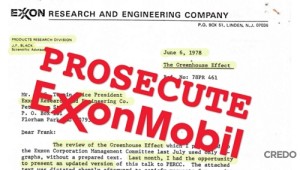
For years journalists, researchers, academics, activists and politicians have been amassing evidence about what the Big Oil companies knew about climate change.
They have painstakingly revealed that instead of acting responsibly, the companies funded a multi-million dollar campaign of climate denial campaign.
Many of these people researching climate deniers were loosely involved with Greenpeace US, which released the ground-breaking Exxon Secrets data-base before turning their attention to the Koch denial machinery, but also others of note include the Climate Investigations Centre, Union of Concerned Scientists; Sourcewatch; Desmogblog as well as academics, such as Naomi Oreskes, who wrote the wonderful Merchants of Doubt, as well as Michael Mann, the climate researcher, who himself has been on the frontline of the climate wars.
So it is now well documented that Exxon and the other oil companies denied basic climate science, they exaggerated the uncertainties in the data, they funded dozens of think tanks, scientists and other groups to promote denial in a devastating echo chamber that still exists today and is evident in many parts of the Trump Administration. The scandal has become known as #ExxonKnew. But it is not just Exxon.
And the evidence keeps on coming. A new report released yesterday by the Center for International Environmental Law (CIEL) at the climate talks in Bonn, synthesizes years of research exposing what the oil industry and other major fossil fuel producers knew about climate change, when they knew it and what they did about it.
The report, Smoke and Fumes: The Legal and Evidentiary Basis for Holding Big Oil Accountable for the Climate Crisis, evaluates that evidence in light of fundamental principles of legal responsibility and concludes that the major carbon producers could and should be held accountable for our changing climate.
The parallels with tobacco are uncanny. Big Oil learnt from the masters of deception, the tobacco industry. Just as the tobacco industry would fund decades of denial, so too would Big Oil. Just as the tobacco industry’s denial campaign started in the fifties, so too did the oil industry’s.
Their own scientists knew the truth, but this would be hidden from the public. Not just for years, but decades. They could have acted to mitigate those risks, but they did not.
As the report makes clear: “At least one major oil company was on notice of evolving climate science as early as 1957. By 1958, the industry as a whole was studying carbon dioxide in the atmosphere through its industry organization the American Petroleum Institute.”
The deceit has continued ever since: “From 1968 onward, the industry was repeatedly warned of the climate risks of its products, including by its own scientists, and often in dire terms. From the 1960s onward, the oil industry was actively patenting technologies that might have been deployed to reduce greenhouse gas emissions or accelerate the shift to clean energy.”
The companies sought to protect themselves, but not protect the public: “By no later than the 1980s and perhaps far earlier, major oil companies were incorporating climate risks into their operational planning for major projects, and taking steps to protect their own assets from long-term climate impacts.”
As has been well documented by me and others: “Throughout the 1990s and 2000s, and despite company documents supporting the scientific consensus on climate change, the petroleum industry engaged in a massive public relations campaign against public understanding of climate science.”
After sixty years of denial and acting irresponsibly, the report argues that: “Evaluated under the laws of tort, the law of non-contractual responsibility in civil jurisdictions, and international human rights law, there are ample grounds to hold companies responsible for those choices.”
“The oil and gas companies involved in denial efforts operated worldwide, and knowledge was shared widely across the industry and within individual companies. It is highly likely that major carbon producers in Europe and elsewhere had notice equivalent to that of their US counterparts.”
Exxon knew. All the oil companies knew. They were not alone either: “Other industries, including the coal industry have well-documented histories of climate denial”, argues the report.
Steven Feit, the CIEL Staff Attorney, says: “There is a reasonable public expectation that if there was a problem with their products, big oil would have been the first to know about it and would have had a responsibility to affirmatively warn the public. Instead they actively sowed confusion and doubt.”
He continues: “Over the seven decades in this timeline, liability may attach to different companies for different theories at different times. However, looking at the evidence as a whole, over time, and across the industry, the answer to whether big oil is responsible is yes.”
Carroll Muffett, CIEL President adds “Exxon and its oil industry allies have given us a decades-long history of climate change, climate denial, and climate chaos. This report exposes that history and suggests that the future of these companies will be marked by climate litigation and climate accountability.”
To read the report go here.
